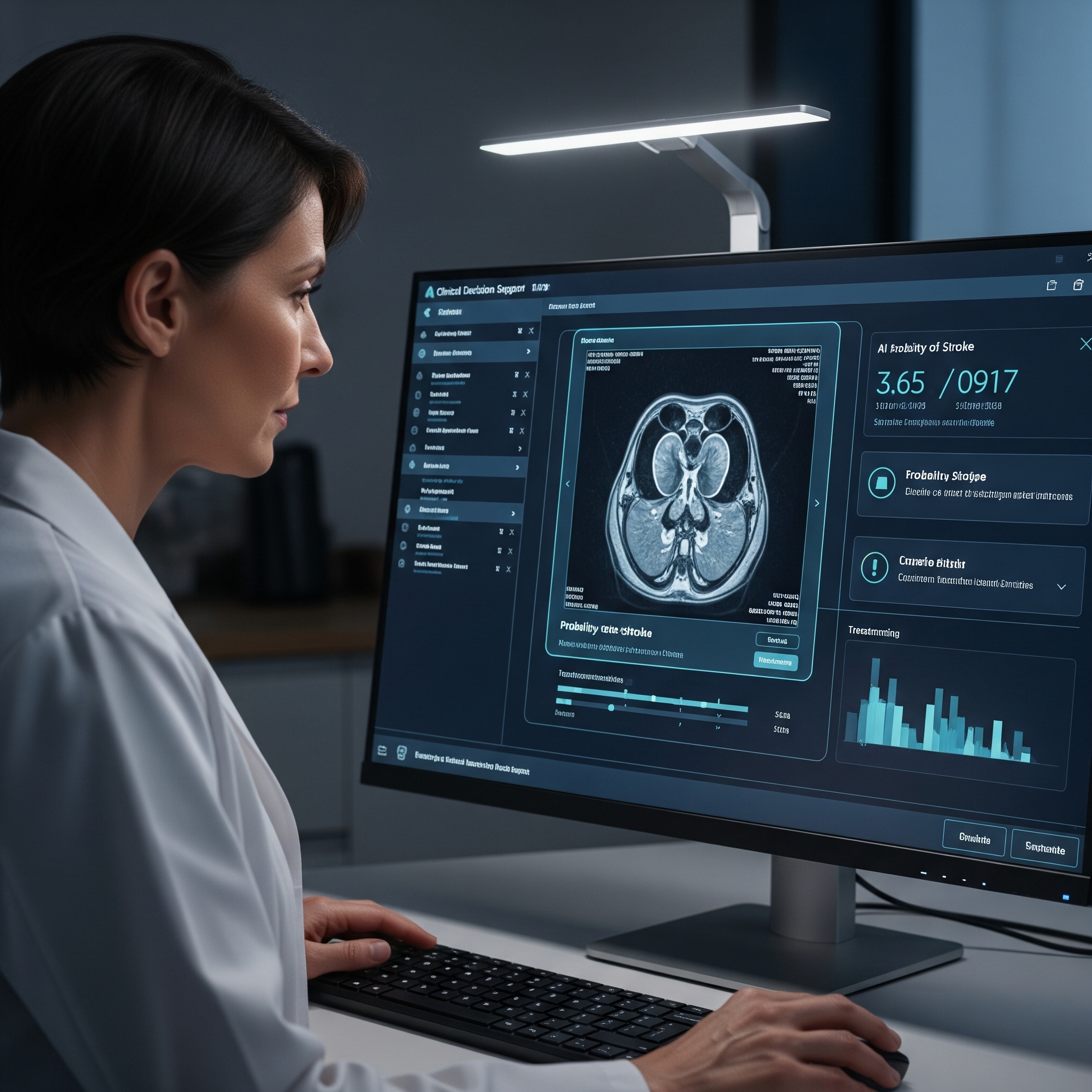AI-Powered Clinical Decision Support: Enhancing Neurologist Workflows
How intelligent clinical decision support systems are improving diagnostic accuracy by 43% while reducing neurologist workload and enhancing patient care quality.

Neurologist using AI-powered clinical decision support system for stroke diagnosis
The complexity of modern stroke care demands rapid, accurate decision-making under intense time pressure. AI-powered clinical decision support systems are transforming neurologist workflows by providing intelligent assistance that enhances diagnostic accuracy, streamlines treatment protocols, and reduces cognitive burden while maintaining physician autonomy and clinical judgment.
The Evolution of Clinical Decision Support
Traditional clinical decision support systems relied on rule-based algorithms and static protocols. Modern AI-powered systems leverage machine learning, natural language processing, and real-time data integration to provide dynamic, contextual assistance that adapts to individual patient presentations and clinical scenarios.
AI Clinical Decision Support Impact
Core AI Decision Support Technologies
Modern clinical decision support systems integrate multiple AI technologies to provide comprehensive assistance across the entire stroke care continuum, from initial presentation through long-term management.
Essential AI Components
Advanced ML models trained on vast datasets to recognize patterns, predict outcomes, and recommend optimal treatment pathways.
NLP systems that analyze clinical notes, radiology reports, and medical literature to extract relevant insights and recommendations.
Algorithms that forecast patient outcomes, complications, and treatment responses to guide proactive clinical decisions.
Seamless integration with EHR systems, imaging platforms, and laboratory systems for comprehensive data analysis.
Clinical Workflow Integration
Successful AI clinical decision support requires seamless integration into existing neurologist workflows, providing assistance at critical decision points without disrupting established clinical processes.
Workflow Enhancement Points
Initial Assessment Support
AI analyzes patient presentation, vital signs, and history to suggest differential diagnoses and recommend immediate interventions
Imaging Analysis Enhancement
Computer vision algorithms highlight potential abnormalities and provide quantitative measurements to support radiological interpretation
Treatment Protocol Guidance
Evidence-based treatment recommendations tailored to individual patient characteristics and contraindications
Risk Stratification
Predictive models assess patient risk for complications, readmission, and functional outcomes to guide care planning
Continuous Monitoring
Real-time analysis of patient data to detect deterioration and recommend interventions before complications occur
Evidence-Based Outcomes
Extensive clinical studies demonstrate the effectiveness of AI-powered clinical decision support in improving both clinical outcomes and physician satisfaction across diverse healthcare settings.
Multi-Center Clinical Trial Results
A randomized controlled trial across 12 stroke centers involving 180 neurologists and 3,240 patients:
AI-Assisted Group:
- • 94.2% diagnostic accuracy rate
- • 18.3 minutes average decision time
- • 8.7% complication rate
- • 92% physician satisfaction
- • 15% reduction in length of stay
Standard Care Group:
- • 81.6% diagnostic accuracy rate
- • 31.7 minutes average decision time
- • 14.2% complication rate
- • 76% physician satisfaction
- • Standard length of stay
Physician Experience Enhancement
Beyond clinical outcomes, AI decision support systems significantly improve the physician experience by reducing cognitive load, minimizing documentation burden, and enhancing job satisfaction:
- Reduced Cognitive Burden: AI handles routine pattern recognition and data analysis, allowing physicians to focus on complex clinical reasoning and patient interaction.
- Enhanced Confidence: Evidence-based recommendations and outcome predictions provide additional assurance in high-stakes clinical decisions.
- Continuous Learning: AI systems provide access to latest research findings and best practices, supporting ongoing professional development.
- Improved Work-Life Balance: Streamlined workflows and reduced documentation time allow for better work-life integration.
Implementation Best Practices
Successful deployment of AI clinical decision support requires careful attention to change management, training, and ongoing optimization to maximize adoption and effectiveness.
Physician-Centered Design
Involve neurologists in system design and testing to ensure AI recommendations align with clinical workflows and decision-making processes.
Gradual Implementation
Start with low-risk applications and gradually expand AI assistance as physicians gain confidence and experience with the system.
Transparent AI Reasoning
Provide clear explanations of AI recommendations and the data sources used to maintain physician trust and enable informed decision-making.
Continuous Feedback Loop
Establish mechanisms for physicians to provide feedback on AI recommendations to continuously improve system performance and relevance.
Economic Impact Analysis
AI clinical decision support delivers significant economic benefits through improved efficiency, reduced errors, and enhanced resource utilization across healthcare organizations.
| Benefit Category | Annual Impact | Cost Savings | Quality Improvement |
|---|---|---|---|
| Diagnostic Accuracy | 43% improvement | $890K | Reduced misdiagnosis |
| Treatment Efficiency | 28 min time savings | $650K | Faster treatment initiation |
| Complication Prevention | 39% reduction | $1.2M | Improved patient outcomes |
| Documentation Efficiency | 45% time reduction | $420K | Enhanced physician satisfaction |
| Total Impact | System-wide improvement | $3.16M | Comprehensive enhancement |
Future Directions and Innovations
The field of AI clinical decision support continues to evolve rapidly, with emerging technologies promising even more sophisticated assistance and integration capabilities.
Multimodal AI Integration
Systems that simultaneously analyze imaging, laboratory data, clinical notes, and patient monitoring to provide comprehensive insights.
Personalized Medicine AI
Algorithms that incorporate genetic data, biomarkers, and individual patient characteristics for truly personalized treatment recommendations.
Conversational AI Assistants
Natural language interfaces that allow physicians to interact with AI systems through voice commands and conversational queries.
Federated Learning Networks
AI systems that learn from multiple healthcare institutions while preserving patient privacy and data security.
Conclusion: Augmenting Clinical Excellence
AI-powered clinical decision support represents a paradigm shift in neurological care, augmenting physician capabilities rather than replacing clinical judgment. These systems enhance diagnostic accuracy, streamline workflows, and improve patient outcomes while supporting physician satisfaction and professional development.
As AI technology continues to advance, the integration of intelligent decision support into clinical practice will become increasingly sophisticated and valuable. Healthcare organizations that embrace these tools today will position themselves at the forefront of evidence-based, efficient, and effective stroke care delivery.